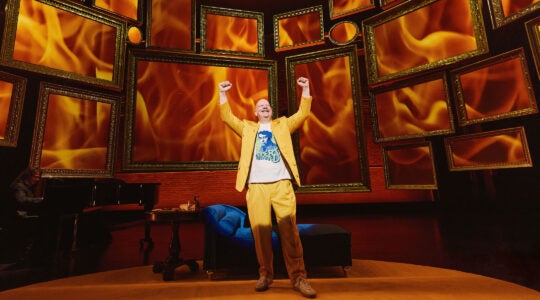Sometimes all it takes to make a short film work is a strong central metaphor. Consider the fascinating pairing of short documentaries about German history, “Rabbit a la Berlin” and “Loss,” opening at Film Forum on Dec. 8. Each is structured around a single overriding conceit and both rise or fall on the strength of that spine. Happily, both films are pretty effective and as a pair they complement one another surprisingly well despite a wild disparity in tone.
“Loss,” written and directed by Israeli cinematographer Nurith Aviv, opens with a quote from Freud in which he extends the definition of mourning to include “an abstraction which has taken the place of [a loved person], such as fatherland, freedom, an ideal, etc.” Famously, post-World War II German society was characterized as being “unable to mourn” for a variety of fairly obvious reasons, some of them intelligently explicated by the four intellectuals who Aviv interviews in the film.
The structuring metaphor of “Loss” is primarily visual. For the entire half-hour running time of the film we see the city of Berlin as it is today, through a train window, sort of a very, very long tracking shot. This shot is juxtaposed with a series of interviews, beginning with a 1964 clip of Hannah Arendt on German TV discussing the shock experienced by German Jews when Hitler came to power. After that, Aviv shows us four contemporary German intellectuals, members of the ’68 generation or slightly older, pondering the nature of a Germany without Jews, of the shattering loss for German culture and society this has meant.
Each of the interviews begins with the speaker superimposed over the image of the scenery passing by. At several points in each interview, the speaker’s image fades out while the voice continues, then fades back in. The result is a frequently unnerving sense of the way that the past still hangs over Berlin, neither departing nor resolving itself in some way.
Early in the film, Arendt says with her usual perspicuity and wry humor that for the German Jews, “the problem was not what our enemies did, but what our friends did.” By passively accepting what happened, she says, “the intellectuals abandoned us,” leaving Arendt and others like her surrounded by a sort of “empty space” that signified the ostracism that preceded exile or extermination.
Ironically, says Clause-Dieter Rath of the Freud-Lacan Society of Berlin, it was the Jewish historical response to that grim choice that should guide Germany. “Facing loss is exactly what Jewish intellectuals have taught us.”
“Loss” is a briskly straightforward work, highly intelligent and ultimately quite moving. The visual metaphor holds the film together admirably, and the talking heads are good ones.
The central metaphor of “Rabbit a la Berlin,” directed by Barnet Konopka, is more complicated and, as it develops over the course of 50 minutes, as all-pervasive as a literary conceit from the metaphysical poets. The film’s factual basis is simple: When the East Germans erected the Berlin Wall, there were actually two walls that ran for some 120 kilometers across the city, with a “death zone” between them, a sort of free-fire zone in which any human being seen crossing was assumed to be trying to escape.
But the stretch of Potsdamer Platz that was encased between these two walls had been a rabbit meadow before, and the rabbits, driven into their burrows by the noise and commotion attendant to the barrier’s construction, returned aboveground to find themselves cut off from the rest of the human world, safe from predators and provided with lush grassland. As evolutionary biologist Dietrich von Holst drily notes, “Reproduction isn’t a problem for rabbits,” and you can imagine what happens next.
For the first 15 or so minutes, “Rabbit” looks like a goofy blend of Disney nature movie and Chris Marker satirical essay, an examination of the Cold War from a rabbit’s-eye view. (In fact, the first image in the film is, well, a rabbit’s eye.) But as the rabbits begin to perceive their splendid new habitat as the product of human attempts to safeguard them, “like a zoo and well-managed,” the filmmakers turn the metaphor on its head, with the rabbits becoming stand-ins for the most passive inhabitants of the East German “workers’ paradise.” The narrator describes them becoming increasingly passive and apathetic, overfed and uninvolved. “They had no influence on anything,” she observes, encapsulating the plight of the happier victims of the Stalinist system.
Of course, when the Wall comes down the rabbits, like their human counterparts in the former Eastern bloc countries, suddenly find themselves free with all the insecurities that come with liberty.
The rabbits seem to have managed rather better than the beleaguered East Germans but, then, they don’t have to look for work in a worldwide recession.
This is all very cleverly done, with some very inventive editing linking the rabbits to Konopka’s narrative. The film is aided immeasurably by a jaunty, knowing and occasionally self-parodying score by Maciej Cieslak, and the narration by Konopka and Piotr Rosolowski (who also shot the film) is cunningly crafted.
“Rabbit a la Berlin” and “Loss” will be are playing at Film Forum (209 W. Houston St.). For information, call (212) 727-8110 or go to www.filmforum.com.
The New York Jewish Week brings you the stories behind the headlines, keeping you connected to Jewish life in New York. Help sustain the reporting you trust by donating today.




